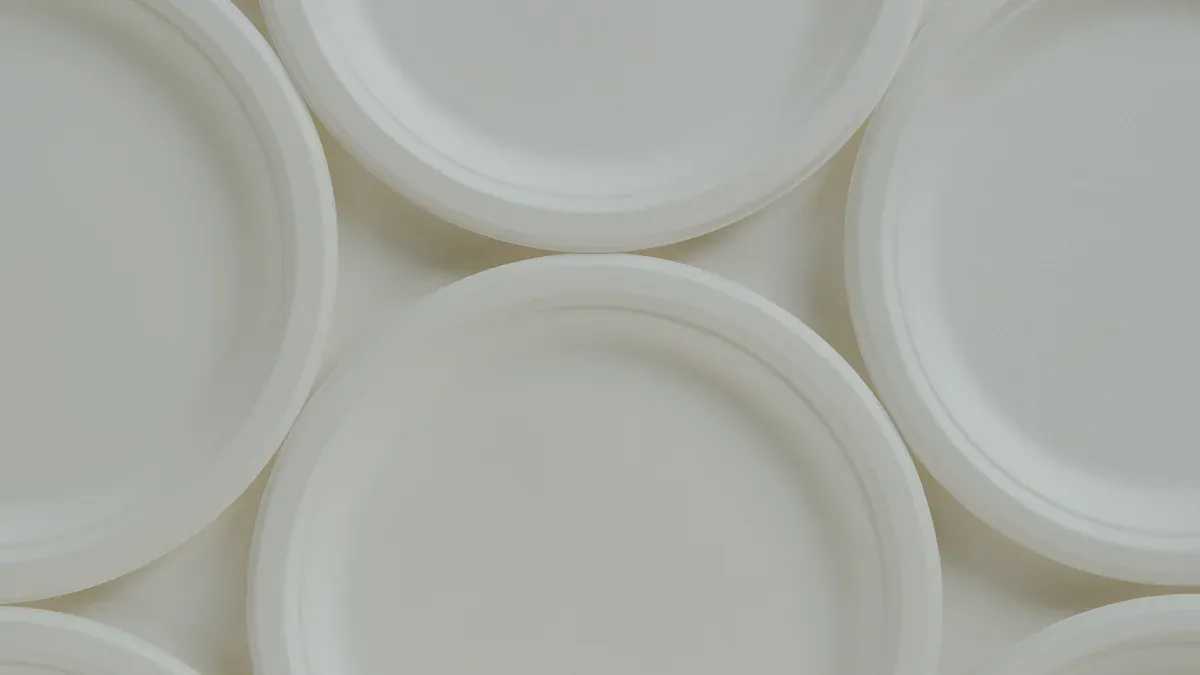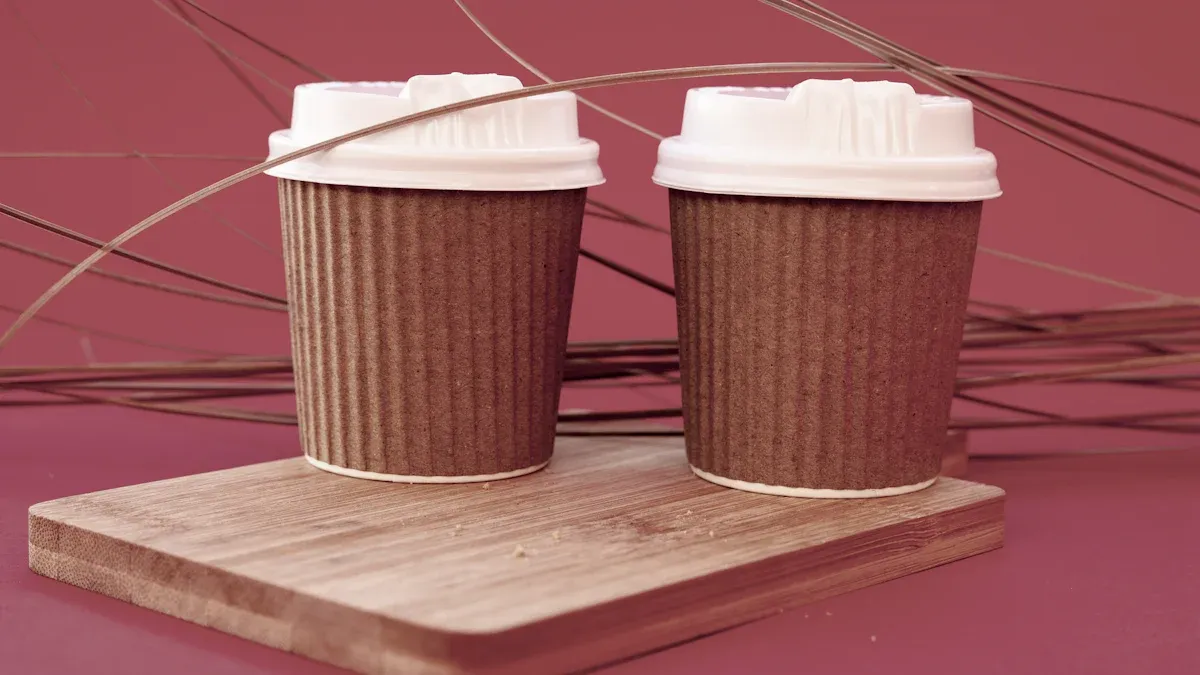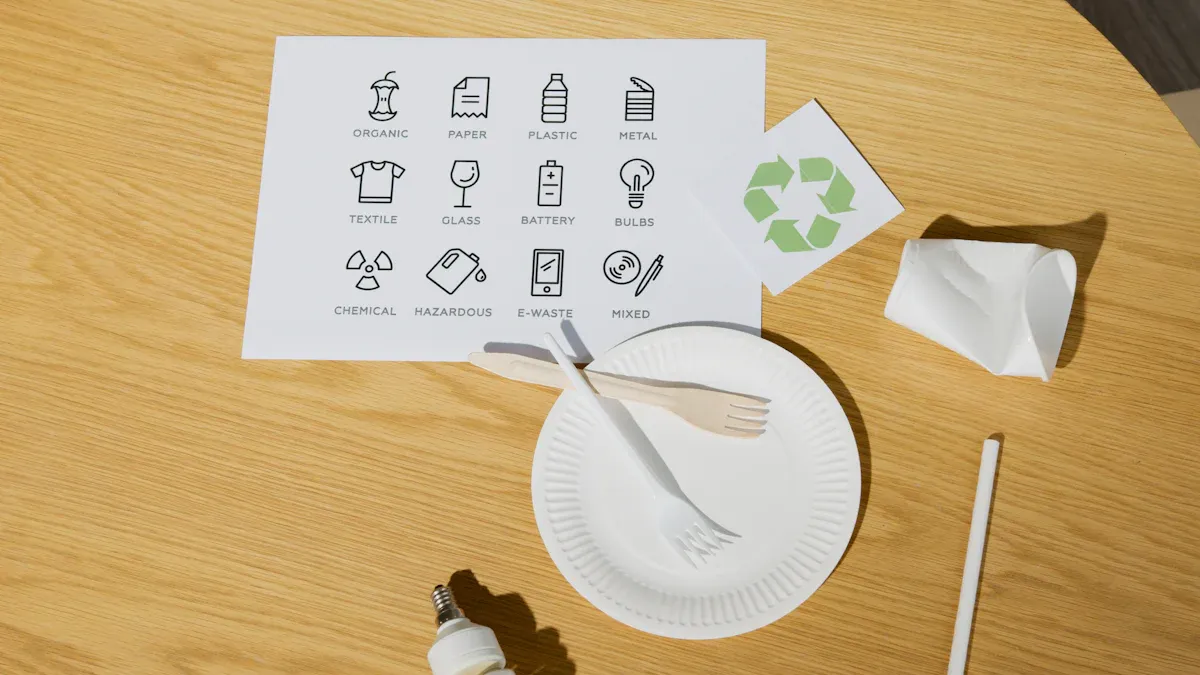
Biodegradable paper plates and cups provide an eco-friendly alternative to traditional disposable tableware. These biodegradable paper plates decompose naturally, reducing the burden on overflowing landfills. In 2018, over 1.4 million tons of paper plates and cups were generated, yet most ended up in landfills due to limited recycling options. Choosing biodegradable options helps address this issue. Products like bio paper plates use renewable materials, making them a sustainable choice. For large events, purchasing biodegradable plates bulk offers convenience while supporting greener practices. Additionally, biodegradable paper plates and cups are designed to be both functional and environmentally friendly. By adopting these alternatives, individuals can contribute to a cleaner environment and promote sustainable living through the use of bio paper plate raw material.
Key Takeaways
- Biodegradable plates and cups break down fast, cutting landfill trash.
- Using biodegradable items can cut greenhouse gases by 73%, fighting climate change.
- These products make cleanup easy and save water, great for events or daily use.
- Buying biodegradable items saves money on trash handling and meets eco rules.
- Picking green tableware encourages others to live sustainably, helping communities.
Environmental Benefits of Biodegradable Paper Plates

How Biodegradable Materials Reduce Waste
Biodegradable materials play a crucial role in reducing waste by breaking down naturally into the environment. Unlike plastic, which can take hundreds of years to decompose, biodegradable paper plates decompose within a few months under the right conditions. This rapid breakdown minimizes the accumulation of waste in landfills. Additionally, these plates do not release harmful chemicals during decomposition, making them safer for the soil and surrounding ecosystems. By choosing biodegradable options, individuals can actively reduce the volume of non-biodegradable waste that pollutes the planet.
Contribution to Sustainability and Pollution Reduction
Switching to biodegradable paper plates significantly contributes to sustainability and pollution reduction. Research shows that bio-based products, including biodegradable tableware, can lower greenhouse gas emissions by an average of 45% compared to fossil-based products. Some categories, such as biorefinery products, even achieve reductions of up to 73%. These reductions help combat climate change by decreasing the carbon footprint associated with disposable tableware. Although some trade-offs exist, such as increased eutrophication, the overall environmental benefits of biodegradable materials outweigh the challenges. By adopting these eco-friendly alternatives, communities can take meaningful steps toward a cleaner and healthier planet.
Supporting Renewable Resources and Circular Economy
Biodegradable paper plates support renewable resources and promote a circular economy. Many of these plates are made from bagasse, a byproduct of sugarcane processing. This material is not only renewable but also compostable, reducing reliance on plastic and encouraging sustainable practices. The production process for bagasse-based plates is simple and cost-effective, utilizing waste materials that would otherwise go unused. By incorporating these plates into daily life, individuals and businesses can help close the loop in the production cycle, ensuring that resources are reused and waste is minimized.
Practical Advantages of Biodegradable Tableware

Convenience for Cleanup and Everyday Use
Biodegradable tableware simplifies cleanup after meals or events. Unlike traditional dishes, these disposable options eliminate the need for washing. After use, individuals can dispose of them directly into compost bins or waste collection systems. This convenience saves time and effort, especially during large gatherings or busy days. Families and event organizers often prefer biodegradable paper plates for their practicality. These plates also reduce water usage, as they do not require cleaning, aligning with eco-friendly practices.
Durability for Heavy or Wet Foods
Biodegradable tableware offers impressive durability, making it suitable for a variety of foods. Plates made from materials like bagasse or bamboo can hold heavy meals without bending or breaking. They also resist moisture, ensuring they remain sturdy when serving wet or oily dishes. For example, a biodegradable paper plate can handle foods like pasta with sauce or grilled meats without leaking. This reliability makes them a practical choice for both casual meals and formal events. Consumers can enjoy the benefits of disposable tableware without compromising on quality.
Aesthetic Appeal for Events and Gatherings
Biodegradable tableware enhances the visual appeal of any event. Products made from materials like bamboo or palm leaves offer a natural and elegant look. These options are ideal for weddings, parties, or corporate events where presentation matters. The growing demand for sustainable yet stylish tableware reflects this trend. Consumers increasingly seek visually appealing options that align with their eco-conscious values.
| Material | Aesthetic Appeal | Environmental Impact | Popularity |
|---|---|---|---|
| Bamboo | Natural aesthetic | Renewable resource | High |
| Palm Leaves | Unique appearance | Minimal impact | High |
Additionally, the market for biodegradable disposable tableware is expanding. Many manufacturers now offer customized designs to meet the needs of different occasions. Products made from bagasse, PLA, and bamboo are particularly popular due to their blend of functionality and style. These options allow hosts to create memorable experiences while supporting sustainable practices.
Cost-Effectiveness of Biodegradable Paper Plates
Comparing Costs with Plastic and Non-Biodegradable Options
Biodegradable paper plates offer a sustainable alternative to plastic and non-biodegradable options. While the upfront cost of biodegradable plates may be slightly higher, their environmental benefits outweigh the price difference. Plastic plates, though cheaper initially, contribute to pollution due to their slow decomposition. As regulations on single-use plastics increase, the demand for eco-friendly alternatives continues to grow. This shift may lead to a decrease in the cost of biodegradable options over time. Choosing biodegradable plates not only supports sustainability but also prepares individuals and businesses for stricter environmental policies.
Long-Term Savings Through Sustainable Choices
Investing in biodegradable tableware results in significant long-term savings. Although these products may cost more initially, they reduce expenses related to waste management and environmental damage. For example, airlines like Air France and KLM have adopted biodegradable tableware to lower operating costs. The lightweight nature of these materials reduces fuel consumption, leading to substantial savings. Similarly, businesses and households can benefit from reduced waste disposal costs by using compostable plates. Over time, these savings make biodegradable options a financially sound choice.
Value in Bulk Purchases for Events
Purchasing biodegradable paper plates in bulk provides excellent value for large events. Bulk buying reduces the per-unit cost, making it an economical option for weddings, parties, or corporate gatherings. Additionally, biodegradable plates simplify post-event cleanup, saving time and labor costs. Event organizers can also enhance their reputation by choosing eco-friendly tableware, appealing to environmentally conscious attendees. By opting for bulk purchases, individuals and businesses can enjoy both cost savings and the satisfaction of supporting sustainable practices.
Aligning with Eco-Friendly Practices
Supporting Personal and Community Sustainability Goals
Biodegradable tableware plays a vital role in achieving sustainability goals for individuals and communities. Compostable plates and cups decompose within weeks, unlike traditional plastics that persist for centuries. This rapid breakdown reduces the environmental footprint of events and daily activities. By choosing biodegradable options, people lower the demand for single-use plastics, which aligns with broader community efforts to reduce waste.
The growing market for biodegradable tableware in countries like India highlights a global shift toward environmentally friendly practices. This trend reflects the increasing awareness of the harmful effects of plastic and the benefits of sustainable alternatives. Products like the biodegradable paper plate promote a circular economy by using renewable materials that decompose and nourish the soil. These choices empower individuals and communities to contribute to a healthier planet.
Encouraging Responsible Consumption
Adopting biodegradable tableware encourages responsible consumption by fostering eco-conscious habits. The rise in environmental awareness has driven many consumers to seek alternatives to plastic. Compostable tableware appeals to these individuals by offering a practical yet sustainable solution. Businesses also benefit from this shift, as using eco-friendly products enhances their corporate responsibility and reputation.
Regulatory measures aimed at reducing plastic pollution further support this transition. Governments worldwide are implementing policies that encourage the use of sustainable materials. These regulations influence both consumers and businesses to adopt biodegradable options, creating a ripple effect that promotes responsible consumption on a larger scale.
Inspiring Others to Choose Greener Alternatives
Choosing biodegradable tableware inspires others to embrace greener lifestyles. When individuals or organizations prioritize eco-friendly practices, they set an example for others to follow. Events that use biodegradable plates and cups demonstrate how sustainability can be integrated into everyday life. This visibility encourages attendees to consider similar choices in their own lives.
The growing popularity of biodegradable products also reflects a cultural shift toward sustainability. As more people adopt these alternatives, they create a collective movement that normalizes eco-friendly habits. This momentum inspires others to explore greener options, fostering a community-wide commitment to environmental stewardship.
Biodegradable paper plates and cups offer an eco-friendly and practical solution to disposable tableware. These products decompose naturally, reducing waste and supporting sustainability. Their cost-effectiveness makes them an excellent choice for individuals and businesses aiming to minimize their environmental impact. By choosing a biodegradable paper plate, consumers contribute to a cleaner planet and inspire others to adopt greener habits.
For more information or to explore eco-friendly tableware options, contact us:
- Address: No.16 Lizhou Road, Ningbo, China, 315400
- Email: green@nbhxprinting.com, lisa@nbhxprinting.com, smileyhx@126.com
- Phone: 86-574-22698601, 86-574-22698612
FAQ
What makes biodegradable paper plates different from regular disposable plates?
Biodegradable plates decompose naturally within months, unlike regular plates that persist for years. They use renewable materials like bagasse or bamboo, which break down into non-toxic components. This process reduces waste and supports eco-friendly practices.
Can biodegradable plates handle hot or oily foods?
Yes, biodegradable plates are designed for durability. Materials like bagasse resist heat and moisture, making them suitable for hot or oily dishes. They maintain their structure without leaking or breaking, even with heavy meals.
Are biodegradable plates safe for composting?
Biodegradable plates are compost-safe when made from natural materials like bagasse or bamboo. They decompose into organic matter, enriching the soil. However, plates with coatings or additives may require industrial composting facilities for proper breakdown.
How should biodegradable plates be disposed of?
Dispose of biodegradable plates in compost bins or designated waste collection systems. If composting at home, ensure the plates are free from non-compostable residues. For industrial composting, check local guidelines for proper disposal.
Are biodegradable plates more expensive than plastic ones?
Biodegradable plates may cost slightly more upfront. However, their environmental benefits and long-term savings, such as reduced waste management costs, make them a worthwhile investment. Bulk purchases can also lower the per-unit cost for events or businesses.
By:hongtai
ADD:No.16 Lizhou Road,Ningbo,China,315400
Email:green@nbhxprinting.com
Email:lisa@nbhxprinting.com
Email:smileyhx@126.com
Phone:86-574-22698601
Phone:86-574-22698612
Post time: Apr-28-2025